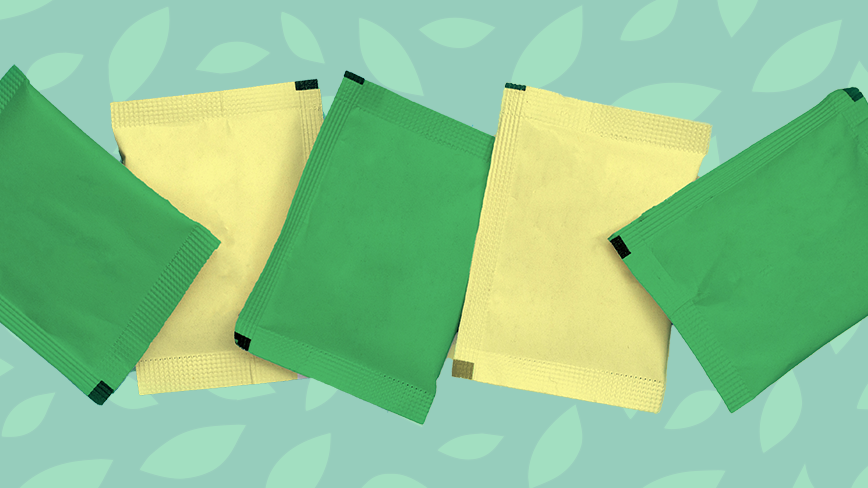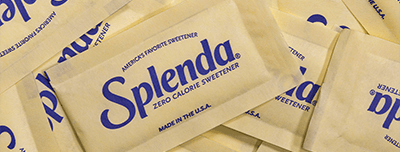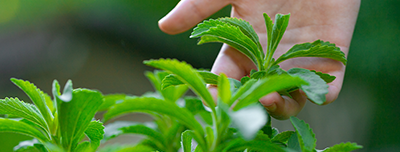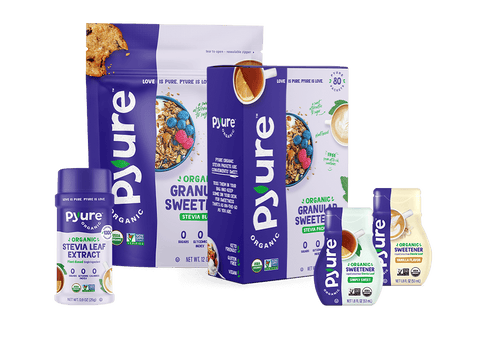
Sucralose vs. Stevia – Which Sweetener is Best?
When it comes to sugar alternatives, sucralose and stevia often find themselves in the spotlight. In this article, we'll take a closer look at these two sweeteners, breaking down their origins, uses, and the scientific discussion around their safety and taste. Let's dive in and separate fact from fiction in the ongoing debate between sucralose and stevia.

Sucralose: Lab-derived sweetener
Sucralose, sold under the brand name Splenda, is a sugar substitute that's used widely because it provides sweetness without the calories. It's made in a lab by changing the structure of sugar molecules, making it incredibly sweet—about 600 times sweeter than regular sugar. Because our bodies don't break it down for energy, it doesn't add to calorie intake. That's why sucralose is often found in products labeled as low-calorie or sugar-free. However, there's ongoing debate about its safety, so it's important to weigh the benefits against potential risks when considering it as a sugar alternative.

Stevia: Plant-based choice
Stevia is a natural, plant-based sweetener extracted from the leaves of the Stevia rebaudiana plant, known for its intense sweetness without the added calories. It's a go-to option for many looking to cut down on sugar without sacrificing sweetness. Since it's derived from a plant (in the sunflower family), stevia is often touted as a natural alternative to artificial sweeteners. You can find it in a wide range of products, including beverages, snacks, and even baking ingredients. Stevia is steadily gaining traction as a plant-based option for those seeking to reduce their sugar intake.
Now, let's break down the similarities and differences between sucralose and stevia across taste, health concerns, and uses:
Sucralose vs. Stevia: Differences and Similarities
Similarities
Concentrated Sweetness
Both sucralose and stevia are intensely sweet. Since stevia is 300x sweeter than sugar and sucralose is 600x sweeter, only minimal amounts have to be used to achieve the desired level of sweetness in foods and beverages.
Low Calorie
Both sweeteners are low in calories or calorie-free. Sucralose, for example, is not metabolized by the body for energy and passes through the digestive system unchanged. Stevia, similarly, provides sweetness without adding calories as it is not metabolized for energy.
Versatility
Both sucralose and stevia are versatile sweeteners that can be used in a variety of food and beverage products, including baked goods, beverages, desserts, and condiments.
Sucralose is commonly found in a wide range of processed foods and beverages, including soft drinks, baked goods, dairy products, and condiments. It is also used in tabletop sweeteners and as an ingredient in recipes. Stevia, similarly, is used in a variety of food and beverage products, including sodas, teas, flavored waters, yogurt, and desserts. Additionally, stevia can be used as a tabletop sweetener and in cooking and baking recipes as a sugar substitute.
Differences
Natural vs Artificial Origins
The biggest difference is where they are derived from. Sucralose is a lab-derived sweetener that's created by chemically modifying sugar molecules. It's made by replacing three hydrogen-oxygen groups on a sugar molecule with chlorine atoms. This process gives sucralose an incredibly sweet taste while allowing it to resist being broken down in the body.
On the other hand, stevia is a natural sweetener derived from the leaves of the stevia plant. This green plant native to South America produces sweet-tasting compounds called steviol glycosides. These natural sweeteners are extracted from the leaves and then purified to make stevia powder or liquid drops. So while sucralose was cooked up by scientists, stevia comes directly from Mother Nature herself.
Taste
While both sweeteners provide sweetness, they have distinct taste profiles. Sucralose is often described as having a neutral taste profile similar to sugar, although many people feel that it has a “chemical taste”. On the other hand, stevia can have a slight licorice taste, which can vary depending on the brand and processing methods used. Either way, taste and sweetness is subjective (check out our Allulose vs Erythritol breakdown for more sweetener comparisons).
Health Concerns
There are ongoing debates regarding the safety and health concerns in this area. Though sucralose has been approved by the FDA, some research suggests drawbacks, impacts on gut health, and possible links to metabolic disorders. As such, many individuals limit their consumption.
Two review studies completed in 2010 found no health concerns with Stevia. Stevia was determined to be safe by an independent panel of experts for the FDA and is classified as GRAS (Generally Recognized as Safe)
Sucralose vs. Stevia in Specialty Diets and Recipes
In specialized diets like ketogenic, diabetic, and vegan lifestyles, choosing between sucralose and stevia matters for flavor and dietary goals. Here's how these sweeteners stack up:
Ketogenic Diets
Both sucralose and stevia work well for keto diets. They're calorie-free making them great for satisfying sweet cravings without kicking you out of ketosis.
Low Glycemic Diets
Sucralose and stevia are good sugar alternatives for managing low glycemic diets. They won't spike blood sugar levels according to most studies, so they're often used in low glycemic-friendly recipes and products.
Vegan Lifestyles
Sucralose and stevia are vegan-friendly sweeteners, so they fit well with plant-based diets. You can use them in vegan cooking and baking without worrying about animal-derived ingredients.
Cooking
Both sweeteners are versatile in cooking, baking, and drinks. Sucralose holds up to high heat, and stevia is very stable at high temperatures, so both work well in baking. Just adjust the amount you use to keep the flavor and texture right.
Understanding how sucralose and stevia fit into specialty diets and cooking helps you use them confidently in your recipes while meeting your dietary needs.
Stevia vs Sucralose: Which is Better?
Now that you're armed with knowledge about the different sources of sucralose and stevia, you can make informed choices about which sweetener fits your lifestyle best! Both offer options for cutting calories or managing blood sugar levels, and both have the FDA stamp of approval as GRAS (Generally Recognized As Safe).
The biggest difference? Stevia is naturally derived, made from the leaves of the stevia plant, while sucralose is a lab-created sweetener. For people looking for more natural options, stevia tends to be the go-to choice. Ultimately though, which sweetener you choose depends on what works for you and your diet. Either one used in moderation is perfectly fine.
If you want a natural AND organic sweetener that's keto, vegan, and low glycemic, try Pyure Stevia Sweeteners. Pyure is organic-certified, ensuring its quality. Available in liquid drops, extract powder, packets, and pouches, Pyure Stevia sweeteners are perfect for adding sweetness to your drinks, recipes, and snacks. Try Pyure Stevia Sweeteners today for a sweeter life without sacrificing taste.


